|
|
|
Sort Order |
|
|
|
Items / Page
|
|
|
|
|
|
|
| Srl | Item |
| 1 |
ID:
147702
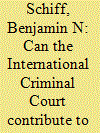

|
|
|
|
|
| Summary/Abstract |
The Responsibility to Protect (R2P) norm asserts that states have duties beyond their borders to help avoid, respond to, and prevent recurrence of circumstances that produce massive human rights violations. Actions undertaken to implement those duties can include aid, reform, or more muscular involvements. The need for such engagement implies that the target state’s government is losing or has lost its legitimacy. Labeling by the International Criminal Court (ICC) of a conflict as a ‘situation’ under its purview asserts that large-scale crimes are likely taking place for which individuals should be held accountable. This should trigger R2P considerations. However, the fit between R2P and the ICC is uncomfortable. Although the ICC may appear a useful tool for R2P, forays into the politics of R2P by the ICC are undertaken at its peril. Moreover, so far, the ICC has not clearly had positive effects upon conflict. While the ICC can be idealized as a contributor to R2P, coordination is formally non-existent and the Court’s protection effects are ambiguous.
|
|
|
|
|
|
|
|
|
|
|
|
|
|
|
|
| 2 |
ID:
023516


|
|
|
|
|
| Publication |
Winter 2003.
|
| Description |
10-26
|
|
|
|
|
|
|
|
|
|
|
|
|
|
|
|
| 3 |
ID:
119964
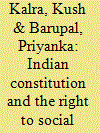

|
|
|
| 4 |
ID:
134032
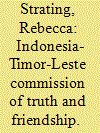

|
|
|
|
|
| Publication |
2014.
|
| Summary/Abstract |
International justice is characterized by the global articulation of basic human rights and peremptory norms outlawing crimes against humanity. In the twenty-first century, an international obligation of states to pursue individuals who bear responsibility for gross violations of human rights has formalized. Since the 1999 independence referendum, Timor-Leste has struggled to achieve substantive justice for the human rights violations committed during Indonesia's 25-year de facto administration. Timor-Leste provides a unique case study on the international dimensions of pursuing justice in a post-conflict transitional context, particularly as many alleged perpetrators of rights violations have been shielded by Indonesia. This presents a challenge for Timor-Leste in balancing its various international and domestic priorities: while domestic political order and rule of law necessitates the pursuit of substantive justice, Timor-Leste's external security interests require a positive relationship with Indonesia. This article examines the world's first bilateral Truth and Reconciliation Commission, the Indonesia-Timor-Leste Commission of Truth and Friendship. It then analyses the implementation of the Commission's recommendations by Indonesia and Timor-Leste. The paper argues that the Commission was primarily a political mechanism designed to support international priorities rather than substantive justice.
|
|
|
|
|
|
|
|
|
|
|
|
|
|
|
|
| 5 |
ID:
102024
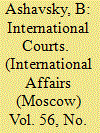

|
|
|
|
|
| Publication |
2010.
|
| Summary/Abstract |
RUSSIA'S POSITION with regard to international justice in general and international courts in particular is important both for diplomatic practice and theory. It is essential to understand the prospects of just decisions being made by international courts on cases to which Russia is a party or in which it has a special interest. Topical issues of international justice became a subject of discussion at a roundtable meeting hosted by the Center of International Law and International Security at the Institute for Contemporary International Studies (ICIS), Diplomatic Academy, Ministry of Foreign Affairs of the Russian Federation.
|
|
|
|
|
|
|
|
|
|
|
|
|
|
|
|
| 6 |
ID:
123523
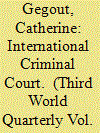

|
|
|
|
|
| Publication |
2013.
|
| Summary/Abstract |
The International Criminal Court ( icc ) aims to promote not only justice, but also peace. It has been widely criticised for doing neither, yet it has to contend with some severe structural and political difficulties: it has limited resources, it faces institutional restrictions, it is manipulated by states, and it is criticised for an alleged selectivity in the way it dispenses justice. However, the icc could contribute significantly to the promotion of international justice and peace, and have a major impact on the prevention of crime, since its prosecutions represent a clear threat to highly placed individuals who commit serious crimes. While this article concentrates on the work of the icc in Africa, the only continent where it has issued indictments against suspected criminals, it also looks at its efforts on other continents. It argues that, in the larger international context, the contribution of the icc to international justice and peace depends on its institutional power and the support it receives from states, on its own impartial work, and on the way it is perceived by potential criminals and victims in the world.
|
|
|
|
|
|
|
|
|
|
|
|
|
|
|
|
| 7 |
ID:
098089


|
|
|
|
|
| Publication |
2010.
|
| Summary/Abstract |
The article analyses the impact of international justice on the debate about public memory and visions of reconciliation in Namibia. Focusing on a recent submission to the International Criminal Court, it shows how domestic actors used international justice to advance their claims for reconciliation and it thus challenges the common assumption that reconciliation is an entirely domestic process. The article discusses how the ICC submission individualized guilt for past human rights abuses and neglected structures of suspicion and denunciation within the guerrilla movement SWAPO. The submission also challenged once more the government's efforts to reduce the complex history of the country's anti-colonial war to a narrative of a unified struggle, and showed that the official policy of active forgetting was still questioned after almost two decades of imposed silence.
|
|
|
|
|
|
|
|
|
|
|
|
|
|
|
|
| 8 |
ID:
090351


|
|
|
|
|
| Publication |
2009.
|
| Summary/Abstract |
Walzer has recently updated his just war theory to take account of terrorism, humanitarian military intervention and new interpretations of the doctrine of self-defence, pre-emptive and preventative warfare The ethical considerations that underwrite Walzer's most recent work invite us beyond the routine citation of his work to a proper consideration of the moral parameters of international politics. Beyond Just and Unjust Wars Walzer has a wealth of insight into the key questions of international theory. His work on toleration, the nature of universality or on the role of social criticism has always been the basis of his insight in to the hard questions of international ethics. Despite being heavily criticised for being communitarian or conservative (both charges that need serious re-evaluation) Walzer's ideas offer a real alternative to the dominant neo-Kantian cosmopolitan tradition and a workable ethical framework for thinking about the challenges of contemporary international politics and international law. Nowhere is this more apparent than in the final essay of Arguing About War. The essay, entitled 'Governing the Globe' offers a radical vision of a reformed international society inspired by the principles that underpin Walzer's development of his just war theory and it is vital that we take notice.
|
|
|
|
|
|
|
|
|
|
|
|
|
|
|
|
| 9 |
ID:
101668
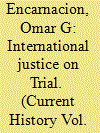

|
|
|
| 10 |
ID:
069767


|
|
|
| 11 |
ID:
111155
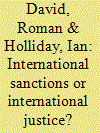

|
|
|
|
|
| Publication |
2012.
|
| Summary/Abstract |
International sanctions, which commonly seek to engineer target state compliance with human rights norms, often fail to deliver on their objectives. In recent years, however, a fresh approach has emerged through the rise of international justice, which can act as either a complement or an alternative to sanctions. In this article, the authors develop three hypotheses. Political change will be facilitated by: (1) lifting sanctions; (2) guarantees of non-prosecution; or (3) lifting sanctions combined with guarantees of non-prosecution. The authors test the hypotheses on Myanmar, a country that has long been subject to international sanctions, but that has rarely complied with human rights norms. Myanmar is also situated in a region where international justice is currently being applied through prosecution of former Khmer Rouge leaders in Cambodia. The authors' test was undertaken in June 2010 through a vignette-based expert survey that manipulated international sanctions, international justice and their absence in a 2 x 2 factorial design. The findings point to the need for a consistent approach. Lifting sanctions and guarantees of non-prosecution, when applied in tandem, are thought likely to promote political change. At the other extreme, imposing sanctions and prosecuting state leaders, when done together, are also viewed as facilitators of political change, though support is considerably smaller.
|
|
|
|
|
|
|
|
|
|
|
|
|
|
|
|
| 12 |
ID:
118256
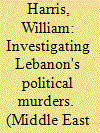

|
|
|
|
|
| Publication |
2013.
|
| Summary/Abstract |
This article reviews the investigation of Lebanon's 2004-2008 string of assassinations, a novel international venture precipitated by the February 2005 assassination of former prime minister Rafiq al-Hariri. It argues that shifting realist and idealist impulses on the international level, alongside a vicious struggle in Lebanon, allowed the intrusion of international justice in the form of the Special Tribunal for Lebanon (STL), although with meager results up to late 2012. The impact on Lebanon of the uprising in Syria against the Asad regime, a prime suspect in Lebanese assassinations, has both overshadowed the affair and raised the stakes involved in the STL's pursuit of it.
|
|
|
|
|
|
|
|
|
|
|
|
|
|
|
|
| 13 |
ID:
188464
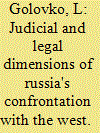

|
|
|
|
|
| Summary/Abstract |
THE WEST'S judicial and legal activities, including efforts to give the military conflict in Ukraine the semblance of an international criminal procedure - putting Russia as a whole, its military, and top officials on trial, as it were - are inevitable and predictable. In the past, international law in its traditional form (and at some point, since World War II, also in the form of criminal procedure) used to take center stage only after the cessation of hostilities, as the victors' right to define a new international order, but these days, it tends to accompany military actions and sometimes even precede them. This has to do with, among other things, the transformation of classical wars into "hybrid" ones that include not only military but also information, economic, and other components and feature no less fierce and crucial legal battles. It also has to do with the unwillingness of certain Western elites to risk their lives on the actual battlefield, participating instead in armchair battles and seeking to appropriate the morally unchallenged legacy of World War II while demonizing the enemy who will allegedly be put on trial at a new Nuremberg tribunal, etc.
|
|
|
|
|
|
|
|
|
|
|
|
|
|
|
|
| 14 |
ID:
094274
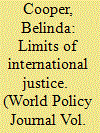

|
|
|
| 15 |
ID:
140322
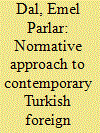

|
|
|
|
|
| Summary/Abstract |
This study explores the cosmopolitanism–communitarianism divide in normative international relations (IR) theory with a special focus on the apparent increasing weight of ethics and morality in Turkish foreign policy. First, it outlines the current debates in normative IR theory with a special focus on the divide between cosmopolitanism and communitarianism. Second, it asks whether Turkey’s foreign policy tradition, both in its discourse and its ethics, leans more toward cosmopolitanism or communitarianism. Then, it examines the slow rise of cosmopolitanism in Turkish foreign policy in the 2000s, with particular reference to the ruling political party in Turkey, the AKP (the Justice and Development Party). Finally, it examines the cosmopolitan/communitarian dilemma that the AKP government faces in the context of the Arab Spring, and specifically the Syrian civil war.
|
|
|
|
|
|
|
|
|
|
|
|
|
|
|
|
| 16 |
ID:
074796


|
|
|
|
|
| Publication |
2006.
|
| Summary/Abstract |
The Special Court for Sierra Leone (SCSL) is located in a fortified compound in central Freetown. Inside its militarised space a project of global significance is unfolding. Together with the International Criminal Tribunal for the former Yugoslavia, the International Criminal Tribunal for Rwanda, and the International Criminal Court, the SCSL is an experiment in bringing the rule of international law and governance to regions recently destabilised by war and conflict.
|
|
|
|
|
|
|
|
|
|
|
|
|
|
|
|
| 17 |
ID:
141666


|
|
|
|
|
| Summary/Abstract |
When applied to Russian aggression and obfuscation of international justice, the word “tragedy” lends an air of inevitability that seems to absolve wrongdoers of responsibility.
|
|
|
|
|
|
|
|
|
|
|
|
|
|
|
|
| 18 |
ID:
050841


|
|
|
|
|
| Publication |
Winter 2003-04.
|
|
|
|
|
|
|
|
|
|
|
|
|
|
|
|
| 19 |
ID:
020882


|
|
|
|
|
| Publication |
March-April 2002.
|
| Description |
128-145
|
|
|
|
|
|
|
|
|
|
|
|
|
|
|
|
| 20 |
ID:
055813
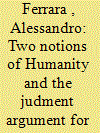

|
|
|
|
|
|
|
|